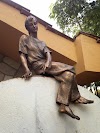 |
| Mrs Nompumelelo Lukhele, head of the Human Trafficking Secretariat, presenting the NSFAP |
Earlier this year, our diocese launched a "Trafficking in persons' desk". It was a natural step to be taken after all the initiatives of the past years: marches, round tables, awareness campaigns... It also followed a meeting of delegates from the Kingdom of Eswatini, South Africa and Malawi at Lilongwe in 2018 where the three countries and three organisations committed to work together: Caritas, the Eswatini Council of Catholic Women and Thalika Kum.
We were therefore grateful for the invitation to attend the launching of "The Kingdom of Eswatini National Strategic Framework and action plan to combat people trafficking" (NSFAP) last 8 August 2019 at the Royal Swazi Spa. Our diocese, through this desk, partners and want to be of support to the efforts being done by government.
No one, in fact, can think of working alone in the fight against this new slavery or, in Pope Francis' words, this crime against humanity. It is present in every country.
We are facing a global phenomenon that exceeds the competence of any one community or country (and therefore) we need a mobilization comparable in size to that of the phenomenon itself (Pope Francis, 2015 Message for the World Day of Peace)
As Mich Coker (representing the USA Ambassador) shared:
Human traffickers throughout the world exploit almost 25 million victims in forced labor and sex trafficking, using coercive or deceptive practices to keep their victims from speaking out or asking for help. Trafficking has become a multi- billion dollar criminal industry that destroys families and communities, weakens the rule of law, strengthens criminal networks, and offends universal concepts of human decency. It is a crime that is hidden in the shadows, where traffickers all too often operate with impunity and prey on victims who are largely unseen.
Ms Nathalie Ndongo-Seh (UN resident coordinator) made us aware that:
Human traffickers are misusing Internet and new technologies to broaden their reach, using apps and chat platforms to exploit and abuse young people who, as we know, represent some of our most connected online citizens around the world.
The event was, for us, also an opportunity to become aware of important elements of the local context:
Eswatini is a source of Swazi victims being trafficked primarily for labour exploitation in neighboring countries (mostly South Africa and to lesser extent Mozambique). It has also been detected that Eswatini is a transit for various African and Asian nationals being trafficked to South Africa for labour exploitation. However, Eswatini is primarily a destination country for nationals of the SADC region and Asia being trafficked for sexual and labour exploitation. (NSFAP 4.1)and therefore:
considering that men have been the majority of victims, it makes sense that the labour exploitation was the purpose of the traffickers. Most sexual exploitation in Eswatini was inflicted on female victims deceived with the promise of work or education opportunities in South Africa, yet ultimately physically and/or sexual abused at the destination.(NSFAP 4.4)
There was a common call to work together and put an end to this crime:
On this commemoration of the World Day against Trafficking in Persons, let us come together to build a future in Eswatini and on the continent where this heinous crime no longer exists. The call to action is primarily addressed to Governments; however, we do encourage every individual, every group, every organization to take action to prevent and combat Trafficking in persons and support the victims. (Ms Nathalie Ndongo-Seh)
Every liSwati should know his or her role in preventing and reporting trafficking (...) Community members can learn the common signs of trafficking and report suspicious conduct. Businesses can take meaningful steps to eliminate forced labor from their supply chains. First responders can enhance training and put in place screening to help identify trafficking victims. Government leaders can prioritize investigating and prosecuting labor and sex trafficking cases wherever they occur. (Mich Coker)
 |
| Group photo at the end of the event |
Speeches can be downloaded by clicking below:




